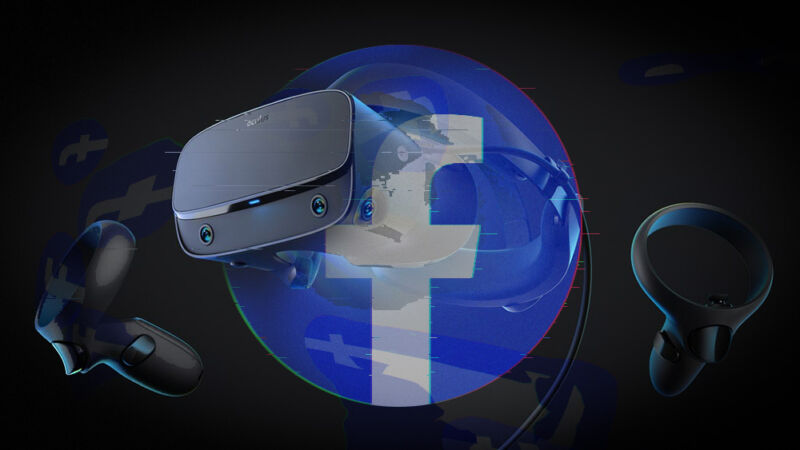Facebook has begun ghosting the “Oculus” moniker in its VR division

Aurich Lawson / Facebook
Our “Facebookening of Oculus” series continues today with the announcement of the Facebook Connect conference as a free, live-streamed event on September 16. You may remember years of “Oculus Connect” conferences, which focused on the company’s efforts in virtual reality and other “mixed reality” mediums. That conference is dead. It’s Facebook Connect now.
In a Tuesday announcement, Facebook exec Andrew Bosworth cited the company’s broader product portfolio as a reason to expand its conference’s definition beyond Oculus. To back that claim up, however, he only cited two Facebook products: Spark AR, the camera-software toolset used to identify faces and add silly effects and filters, and Portal, the company’s webcam-chat hardware platform. Having attended many Oculus Connect conferences, I can safely say neither of those product lines received much focus (and attending VR-interested developers didn’t express interest in it either).
Now it’s FRL, soon it’s FBOS?
What’s more, Facebook used the Tuesday announcement as an opportunity to rename its entire Oculus VR division: Facebook Reality Labs. That name may sound familiar, since it was given to a number of skunkworks teams working on experimental VR-like features and hardware (including years of focus on 3D spatial audio at its Seattle-area office).
Facebook isn’t shy about explaining why it is renaming everything: to collate and combine its disparate entities in order to “build the next computing platform to help people feel more present with each other, even when we’re apart.” That sure sounds like a bold admission of the so-called “Facebook operating system” that I keep hearing rumors about, with VR, mixed reality, and smartphone cameras at its core. Facebook has spent months hinting at mixed computing systems being combined in the workplace, which the company has conveniently summarized in a new Facebook Reality Labs post from today.
While Facebook paid $2 billion to acquire Oculus in 2014, that money was clearly spent more on the underlying VR technology than on the name, and it remains to be seen whether any of the company’s future VR headsets will be stripped of “Oculus” branding as well. (For what it’s worth, today’s FRL announcement cites “Oculus” as a hardware line multiple times.)
“Much like Facebook’s recent corporate rebranding, our emphasis is on clarity—visually identifying us as a part of Facebook while looking toward the future of the next computing platform that puts people at the center,” Bosworth writes in today’s announcement. But I would argue that this smushing of seemingly unrelated products—VR headsets, webcam chat platforms, funny-face filters, and the smorgasbord of social media content that is an average Facebook feed—only serves to obfuscate what Facebook is trying to sell to consumers. Previously, you could expect to purchase an Oculus headset, then buy, download, and install preferred VR software (or even attach it to more open sales platforms like SteamVR and Windows Mixed Reality).
As we’ve recently learned, that kind of “whatever software you want” freedom may not be in the cards for Oculus hardware much longer, since Facebook will soon start mandating Facebook logins for all brand-new hardware—and I’ve previously predicted that new hardware will be a centerpiece of the company’s next major VR event (which we now know is happening on September 16). Whether new hardware will include other Facebook-specific mandates, like a built-in suite of Facebook-connected social spaces and games, remains to be seen; if so, these would effectively bully out other social and gaming software partners. One could argue that apps like Rec Room and VRChat helped Oculus get to where it is today by delivering the kind of social spaces that Facebook and Oculus have repeatedly failed to maintain. (One of its biggest attempts, the feature-incomplete Facebook Spaces, barely lasted two years before being canceled in favor of another in-development app, Facebook Horizons.)
All of this continues to reek in ways that I expressed my disdain about last week:
Facebook is taking what many users will argue is, on its face, a “dumb” system—the equivalent of a computer monitor combined with a microphone and a mouse-like controller—and leveraging its competitive advantage to install Terms of Service and data-collecting priorities onto an attached hard drive. And regulators should begin understanding exactly what Facebook is doing—and how comparable it is to existing technologies and business initiatives, as opposed to some mystifying, “unique” VR consideration—so they can reject the whole thing.
Oculus already offers ties to Facebook features, which is well within its purview. But users currently have a choice. Facebook wants to take that choice away.
For these reasons, simply advocating that people not buy Oculus products isn’t good enough. Mandated Facebook accounts on any…
Read More: Facebook has begun ghosting the “Oculus” moniker in its VR division

